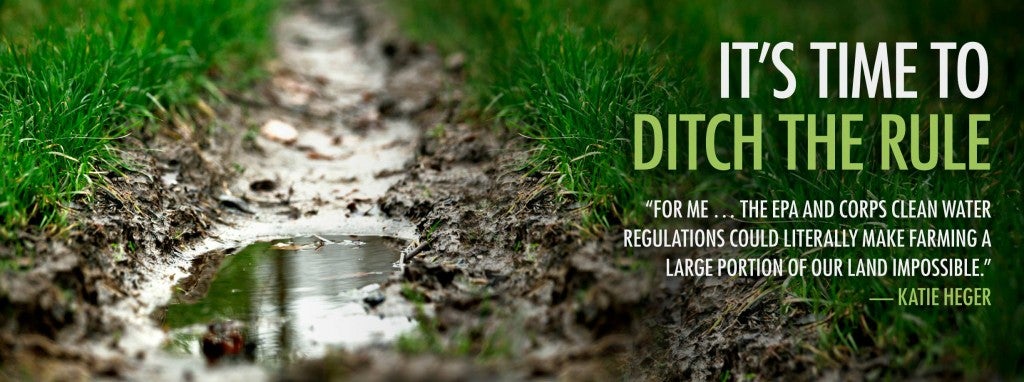Property Rights at Stake in EPA’s Water Power Grab
by Daren Bakst Heritage Foundation Daily Signal July 23, 2014
Thanks to the federal government, it soon may become far more difficult to use and enjoy private property. The Environmental Protection Agency and the Army Corps of Engineers want to make a water—and land—grab that should scare everyone.
Under the Clean Water Act, the federal government has jurisdiction over “navigable waters,” which the statute further defines as “the waters of the United States, including the territorial seas.” Property owners often need to get permits if waters covered under the law will be impacted. Therefore, a critical question is what types of “waters” are covered under the CWA. That’s what the EPA and Corps seek to address with a new proposed rule that would define “the waters of the United States.” As expected, the EPA and the Corps are seeking to expand their authority to cover waters never imagined when the Clean Water Act was passed in 1972.
For example, the new proposed rule would regulate all ditches, except in narrow circumstances. This even includes man-made ditches. The rule would apply to tributaries that have ephemeral flow. This would include depressions in land that are dry most of the year except when there’s heavy rain.
There’s widespread opposition to the proposed rule. Farmers and ranchers are concerned that the rule could affect normal agricultural practices. Homebuilders could face additional development costs that would likely be passed on to buyers. Counties are concerned because of costly new requirements that could impact municipal storm sewer systems, roadside ditches, among other things.
This broad overreach could have significant costs and delays for permit applicants. In Rapanos v. United States (2006), a major CWA case, Justice Antonin Scalia cited a study highlighting the following costs and delays for one of the major types of permits (Section 404 permits), “The average applicant for an individual permit spends 788 days and $271,596 in completing the process, and the average applicant for a nationwide permit spends 313 days and $28,915—not counting costs of mitigation or design changes.”

The American Farm Bureau Federation launched a national campaign to inform people why the Clean Water Act should be ‘ditched.’ (Photo: American Farm Bureau Federation Facebook)
If the EPA and Corps expand their authority over more waters, property owners will have to secure additional permits. They will have to get permission from federal bureaucrats to enjoy and use their property because of waters that were never intended to be regulated under the CWA. If property owners don’t comply with the law, they could face civil penalties as high as $37,500 per day per violation, or even criminal penalties.
In their craving for more power, the EPA and Corps are ignoring a critical aspect of the CWA: cooperative federalism. Both the states and federal government are supposed to play a role in implementation of the law. Yet, this power grab is an attempt by the federal government to push out state and local governments.
At the start of the CWA it states, “It is the policy of the Congress to recognize, preserve, and protect the primary responsibilities and rights of States to prevent, reduce, and eliminate pollution, to plan the development and use (including restoration, preservation, and enhancement) of land and water resources…” The EPA and Corps are pretending that this important policy doesn’t exist.
The EPA also had to ignore sound science and proper rulemaking to move forward with its power play. The agency developed a draft report entitled Connectivity of Streams and Wetlands to Downstream Waters: A Review and Synthesis of the Scientific Evidence. A Scientific Advisory Board was convened to peer review the study, which when finalized would provide the scientific foundation for implementation of the rule.

Wisconsin farmers fight against the Environmental Protection Agency’s and U.S. Army Corps of Engineers’ ‘waters of the U.S.’ proposed rule. (Photo: American Farm Bureau Federation via Facebook)
However, the EPA finalized the proposed rule before the Scientific Advisory Board even met. The EPA defends this action by claiming that the final study will still help inform the final rule. But this is putting the cart before the horse (or the rule before the science). The scientific foundation should inform the proposed rule so that the public can provide informed comments and have a meaningful voice in the process.
The public may be commenting on a proposed rule that seems to be a mere placeholder rather than a real policy proposal, or more likely, a proposal that already reflects the final conclusions of the EPA. The EPA has a strong incentive to avoid making major changes to the draft scientific report and, as a result, the final rule. If major changes are made, the EPA might be forced by law to restart the rulemaking process over.
Congress is taking notice. The House Transportation and Infrastructure Committee passed a bill (H.R. 5078) that would prohibit implementation of the proposed rule, and legislation (S. 2496) has been introduced in the Senate to prohibit implementation as well. In addition, the FY 2015 House Interior and Environment appropriations bill that passed out of the appropriations committee includes a provision that withholds funds for implementation of the rule.
Ultimately though, it is the responsibility of Congress to define the term “navigable waters” instead of deferring to the EPA and the Corps. History shows these agencies will continue to seek to expand their authority. As with other laws, Congress needs to reassert its authority and rein in agency overreach. Private property rights are at stake.
---30---
Daren Bakst studies and writes about agriculture subsidies, property rights, environmental policy, food labeling and related issues as The Heritage Foundation’s research fellow in agricultural policy.